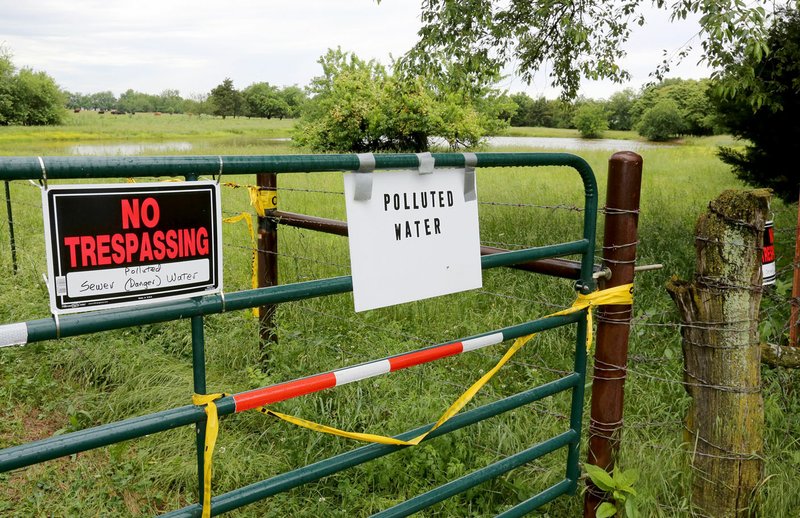BETHEL HEIGHTS -- Bethel Heights released a statement on its website Friday denying allegations of operating its wastewater treatment plant outside of its permitted limits.
The statement also says city officials believe wastewater runoff on neighbors' property was caused by rain. It attributes test results showing high fecal levels to the livestock operations on private land adjacent to the treatment plant.
The Arkansas Department of Environmental Quality sent the city a letter Wednesday, giving the officials until the close of business Friday to come up with an interim plan to get its sewer problems under control.
Officials of the state office said Monday afternoon the city submitted by Friday an interim plan for improvement and a plan to inform residents about the situation and unsafe conditions.
The communication plan submitted by the city includes the statement of denial on the website and a notice that further updates will come through the website.
The interim improvement plan includes hauling wastewater to the Northwest Arkansas Conservation Authority's treatment plant in southern Bentonville. The city said it also will improve equipment for certain zones at its own treatment facility.
The city also will treat areas of pooling by applying lime, as was recommended to city officials by the Arkansas Department of Health, the interim improvement plan concludes.
An email sent Monday from the state said department officials are reviewing the submissions from the city.
Bethel Heights' wastewater treatment plant has operated for at least five years out of compliance with its permit, department records show. On May 6, the agency gave Bethel Heights officials until Aug. 9 to develop a plan to fix the system after a February inspection found it again out of compliance.
The city also was asked to submit results of weekly testing of the system. An email from the department said city officials were asked to submit photographs of each drip field, copies of analytical results and a chain of custody within five days of the sampling event when pooling of water is noticed.
Bethel Heights noted in its website statement the city pays a testing lab to pull the samples off the drip fields and city employees aren't involved in this process.
The city's statement also indicates the city plans to submit a report by Aug. 9.
The state environmental quality department collected samples around the city's wastewater treatment plant July 16 showing fecal coliform levels higher than the laboratory tests typically used to monitor wastewater could measure, according to the latest test results provided to the department. That statement acknowledged the Aug. 9 deadline imposed by the department in May to develop plans for a permanent fix.
Joe Brooks has been the spokesman for his family, whose property lies adjacent to the Bethel Heights water treatment plan and who have repeatedly have made claims of contamination of their fields and ponds.
He said the most recent results came from samples taken at the wastewater treatment plant by the environmental quality office.
"We again ask the ADEQ to shut down this illegal activity and require Bethel Heights to start pumping its water into tanker trucks and hauling it to a licensed sewer treatment plant for disposal," Brooks said.
Property owners near some of the treatment fields have started a petition drive to consolidate the smaller town into Springdale, allowing Springdale to take over wastewater treatment. Bethel Heights has about 3,000 residents.
Leaving one city for another will require petitions filed in favor of the change in both cities. Each of the two cities' petition must have signatures of at least 15 percent of the number of voters in the last mayoral election. Then voters in each of the two towns would have to approve the change. A simple majority vote in each city would pass the measures.
Bethel Height's wastewater system was out of compliance for 32 months -- from May 2013 to December 2016, according to records of the state department of environmental quality. The state granted 16 months of extensions for the city to fix its problems.
Records show the city stayed out of compliance for five more months during that time because the department didn't follow up on a June 1, 2014, deadline until Nov. 4 of that year.
The state considered Bethel Heights in compliance for most of 2017 and all of 2018, even though the city's monthly reports showed it was violating its permit.
The city's wastewater system consists of a septic tank-pumped sewage collection system, known as a STEP system. Wastewater is collected from the sewage system and sent to one of two treatment facilities.
Large solids and waste are removed, and the treated water runs through a series of pipes just below the ground on several acres. The final treatment of the wastewater depends on natural aerobic and bacterial activity of the soil, rather than being discharged or released into a lake, stream or river.
Documents from the environmental quality department record sewage surfacing in a treatment field as early as August 2013.
NW News on 07/30/2019

